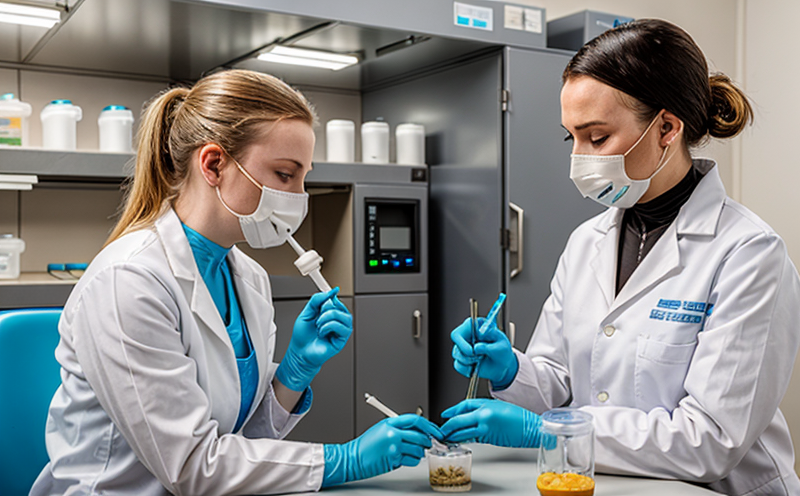ISO 39724 Deoxynivalenol Analysis in Breakfast Cereals
The analysis of Deoxynivalenol (DON), a mycotoxin produced by Fusarium species, is crucial for the food and feed industry due to its potential adverse effects on human health. DON contamination can occur during various stages of crop production, processing, storage, and distribution. In breakfast cereals, even trace amounts of DON can have significant implications as they are consumed in large quantities by vulnerable populations such as children.
ISO 39724 is an international standard that provides a method for the determination of DON in food products, with particular emphasis on its application to cereals and other grain-based foods. This service ensures compliance with regulatory requirements set forth by bodies like the European Union’s Maximum Levels Regulation (EU) No 1126/2011, which sets tolerances for mycotoxin levels in cereal products.
The process involves several critical steps: sample preparation, extraction, and quantification. Sample preparation is essential to ensure that the DON molecules are released from their matrix without compromising their integrity. The extraction step typically utilizes a solvent-based approach, followed by clean-up procedures such as solid-phase extraction (SPE) or liquid-liquid partitioning. These techniques aim at isolating the target mycotoxin with minimal interference from other compounds.
The quantification of DON is achieved through chromatographic methods like Liquid Chromatography-Mass Spectrometry (LC-MS/MS), which offers high sensitivity and selectivity necessary for detecting low levels of DON. LC-MS/MS allows for the simultaneous analysis of multiple mycotoxins, providing a comprehensive overview of contamination issues within batches or lots.
Our laboratory adheres strictly to ISO 39724 guidelines throughout the entire process, ensuring accurate and reliable results. This method not only helps manufacturers meet regulatory standards but also enhances consumer confidence by demonstrating commitment to quality and safety.
- Sample Preparation: Ensures that all components of the sample are accessible for extraction.
- Extraction: Utilizes solvents to liberate DON from its matrix, followed by cleanup steps to isolate it effectively.
- Quantification: LC-MS/MS technology provides precise measurements of DON concentrations within acceptable limits.
By adhering strictly to ISO 39724 methods and using advanced analytical techniques, we ensure that every test conducted is accurate, reproducible, and reliable. This approach guarantees compliance with international standards while providing actionable insights into product quality.
Why It Matters
The presence of DON in breakfast cereals can pose serious health risks if consumed regularly at levels exceeding the maximum limits prescribed by regulatory authorities. Chronic exposure to DON has been linked to immunosuppression, gastrointestinal disturbances, and neurological disorders. For infants and young children who consume large amounts of these products, the risk is even higher.
Regulatory compliance is paramount for food producers; non-compliance can lead to product recalls, fines, reputational damage, and loss of market share. Ensuring that your products meet or exceed regulatory requirements not only protects consumers but also strengthens brand trust and loyalty.
In addition to legal obligations, proactive testing helps identify potential issues early in the supply chain, allowing for corrective actions before they become significant problems. This proactive approach ensures product consistency and quality, which is critical for maintaining customer satisfaction.
By adhering strictly to ISO 39724 methods and using advanced analytical techniques, we ensure that every test conducted is accurate, reproducible, and reliable. This approach guarantees compliance with international standards while providing actionable insights into product quality. Our commitment to excellence ensures that your products not only meet but exceed regulatory expectations.
Benefits
Compliance with ISO 39724 offers numerous benefits beyond mere regulatory adherence:
- Enhanced Consumer Confidence: Proven absence of harmful contaminants fosters trust in your products.
- Promotes Product Integrity: Reliable testing ensures consistency and quality across batches or lots.
- Facilitates Market Access: Compliance with international standards opens doors to global markets.
- Safeguards Reputation: Proactive measures protect your brand’s reputation against potential crises.
- Avoids Legal Penalties: Non-compliance can result in costly fines and legal actions. Prevention is key.
- Strengthened Customer Relationships: Consistent quality builds long-term customer relationships.
- Operational Efficiency: Regular testing helps identify potential issues early, reducing downtime and costs associated with recalls or batch rejections.
- Better Decision-Making: Access to accurate data enables informed decisions regarding ingredient sourcing, processing conditions, and storage practices.
In summary, ISO 39724 testing is not just about meeting regulatory requirements; it’s about safeguarding your reputation, ensuring product integrity, and fostering trust with consumers. By investing in this service, you are making a strategic investment in the long-term success of your business.





